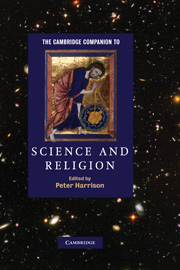Book contents
- Frontmatter
- Introduction
- Part I Historical interactions
- Part II Religion and contemporary science
- 6 Scientific creationism and intelligent design
- 7 Evolution and the inevitability of intelligent life
- 8 God, physics and the Big Bang
- 9 Psychology and theology
- 10 Science, bioethics and religion
- Part III Philosophical perspectives
- A guide to further reading
- Index
7 - Evolution and the inevitability of intelligent life
from Part II - Religion and contemporary science
Published online by Cambridge University Press: 28 July 2010
- Frontmatter
- Introduction
- Part I Historical interactions
- Part II Religion and contemporary science
- 6 Scientific creationism and intelligent design
- 7 Evolution and the inevitability of intelligent life
- 8 God, physics and the Big Bang
- 9 Psychology and theology
- 10 Science, bioethics and religion
- Part III Philosophical perspectives
- A guide to further reading
- Index
Summary
Near the end of his epochal book On the Origin of Species Charles Darwin (1860) famously remarked that 'light will be thrown on the origin of man and his history'. Indeed it has. If Darwin were with us today we can be sure that he would be fascinated by the remarkable progress made over the past 150 years, but one suspects that he would not be over-surprised at the achievements to date. Molecular biology has confirmed our close relationships to the great apes while palaeontology has documented a series of dramatic changes, most obviously in brain size and tool cultures. In little more than a geological instant, a population of apes scattered thinly across Africa transmogrified into extremely complex societies numbered in billions, representatives of which have sent probes beyond the solar system and (at somewhat less expense) can determine the molecular profile of any living organism. These are two of many examples, and nobody needs to be reminded that whatever else humans have achieved, and however much we may take it for granted, the capacity to arrive at scientific understandings which are underpinned by the rational discourse of mathematics is not only astonishing, it is actually very odd indeed.
- Type
- Chapter
- Information
- The Cambridge Companion to Science and Religion , pp. 148 - 172Publisher: Cambridge University PressPrint publication year: 2010
- 3
- Cited by



